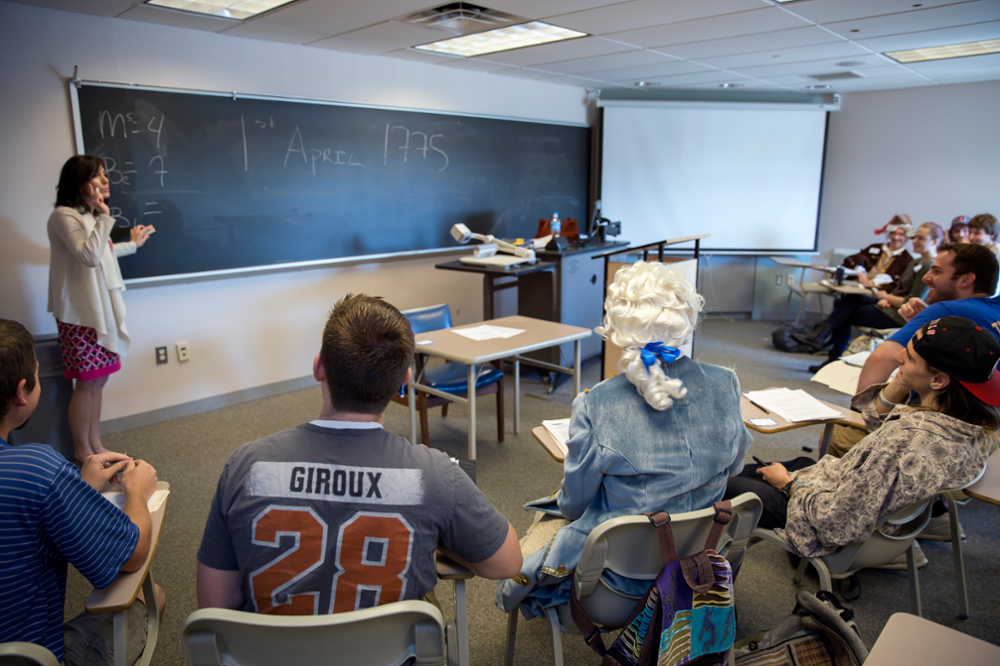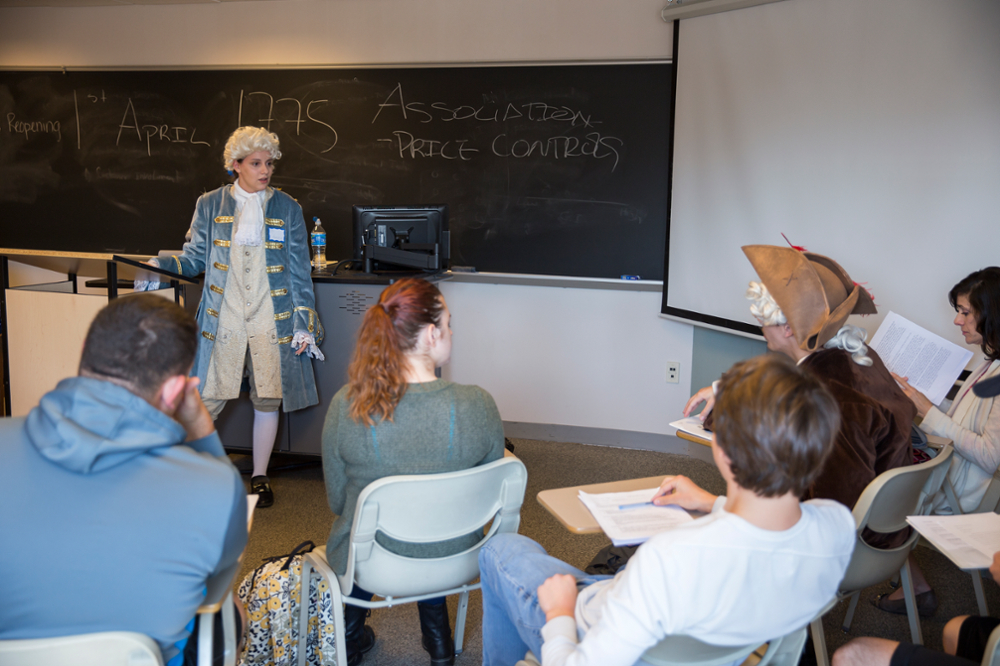Innovative Practices Spotlight
CAE Innovative Practices Spotlight

The Center for Academic Excellence is recognizing a faculty member every month in the CAE Innovative Practices Spotlight to highlight his or her innovative classroom practices and outstanding contribution to Millersville University.
Dr. Robyn Davis is being recognized in February for her exceptional use of Reacting to the Past lessons in her History courses!
Please continue reading to learn more about her exciting experience and to learn ways to incorporate innovative practices into your classroom.
1. What innovative practice did you incorporate into your classroom?
In my upper-division W course on Revolutionary America, a newly-devised UNIV 103 class on the pivotal year 1776, and my "P" course on culture and community in 17th-century Anglo-America, I incorporated various Reacting to the Past historic role-playing games. RTTP is the epitome of flipping the classroom because for the duration of the "game," students run the show in a multi-session role-playing scenario that places them in moments of historic controversy and intellectual ferment. The class as a whole becomes the public body and the students, in role, become particular figures from the period, often as members of a faction. They act in concert (or in opposition - everyone has a secret agenda!) to achieve "victory." Students perform their roles by doing significant research in primary and secondary sources, writing and delivering speeches and policy positions, participating in informal debates and negotiations, and otherwise working together to achieve their goals.
In the Revolutionary courses, students found themselves in the turmoil of revolutionary New York City in 1776 - where Loyalists and Patriots fought for political advantage among a divided population of political moderates, workers, women, and slaves and either accepted or rejected the 1776 Declaration of Independence. Next, they jumped into the Constitutional Convention of 1787, where Nationalists and Confederalists debated the proper frame of republican government. In their authentic historical roles, they confronted practical issues like debt, bribery, invasions of privacy, and collapsing economic opportunity along with ideological concerns like natural rights, the philosophical foundations of government, and differing definitions of tyranny. Sectional interests, private deal-making, personal rivalries, foreign intrigue, and the dangers of mob violence and public exposure all added drama to the proceedings! In my Perspectives course, students recreated two of the most tumultuous and significant episodes in 17th century Anglo-American history: the 1637 trial and excommunication of Anne Hutchinson in Puritan Boston and the invasion of England by the Protestant William of Orange and overthrow of the Catholic James II. At the heart of both games is the question of the proper nature of political authority and its legitimacy. Both of these RTTP games placed the students in moments of upheaval in worlds far different than their own. Yet the questions they debated remain relevant: What did it mean to be saved? Who was to judge? Where are the limits of religious tolerance? Should the State enforce those limits? Finally, who should wield that power?
2. When did you implement the new practice into your classroom?
I first used RTTP in the classroom in Fall 2015. Some academic years, I run games in multiple classes in both semesters. I will be incorporating an RTTP Flashpoint game this semester (this is a 1-day game on a single issue).
3. Did the students willingly accept the use of the new practice? What were the reactions of the students?
They did actually. Although I was really anxious about introducing this pedagogy the first time - SO MANY THINGS could have gone wrong - and some of the students were a bit skeptical, the gamification and the victory points (both personal and factional) seemed intriguing enough that they went along with it.
4. How has the use of the new practice positively affected the classroom learning environment?
It has been TRANSFORMATIVE. Students arrived early, stayed late, discussed strategies and debated ideologies in the hallway - they were electrified. I will let them speak for themselves:
"I learned more in this class than any American history class I have ever taken."
"The Game was an awesome experience... It challenged me to think about the events and information, to question and to speculate. By placing myself in the situation I gained a new perspective..."
"The game did make the Revolution seem less romantic to me... When I denounced the Boston Tea Party as terrorism and vandalism, it dawned on me that was indeed terrorism and vandalism."
"I enjoyed the game and... found that it provides an intellectual outlet for the material studied."
5. How has the use of the new practice affected student engagement in the classroom and the level of participation?
Because students run the events for weeks, student engagement is essential. In almost all cases (the UNIV 103 class was my least successful class), student engagement has been remarkably high. Again, here is what a student had to say:
"It forces everyone to be involved in some way or another and also encouraged teamwork - not only with your faction but the others as well to try and make deals..."
"It got classmates to engage a lot more than they ever would have with standard lectures or even small group projects."
6. What challenges did you encounter when you were implementing the new practice?
Going from a passive lecture environment to an active, student-led, historical recreation was sometimes bumpy - and my preparation for the games is significant. Some of the challenges were just the hiccups to be expected when doing something new for the first time. Some were a bit more daunting. The readings in primary documents in particular can be challenging but the students come to learn that they really can't participate if they don't understand the material thoroughly. So it's almost a self-correcting problem...
A Glimpse into the RTTP Experience:

